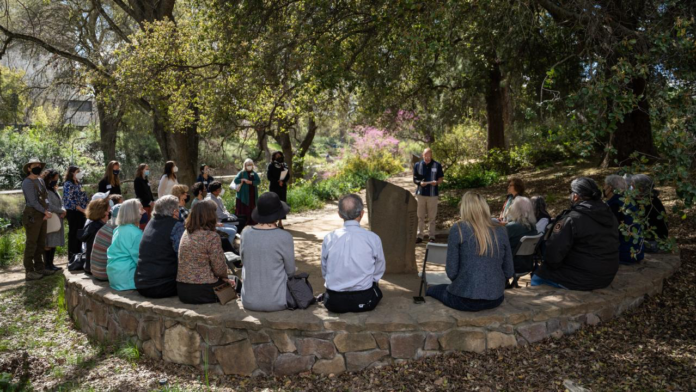UC Davis was built on land that originally belonged to the Patwin people, and according to community members, the university’s Land Acknowledgement Statement is only the beginning of reparations
By ANVI KALUCHA — features@theaggie.org
Posters reminding students of the UC Davis Land Acknowledgement Statement are posted all across campus — in bathrooms, on bulletin boards and in many community spaces. The statement, which was updated on March 23, opens with, “We should take a moment to acknowledge the land on which we are gathered. For thousands of years, this land has been the home of Patwin people.”
The Patwin consist of three federally-recognized tribes: Cachil DeHe Band of Wintun Indians of the Colusa Indian Community, Kletsel Dehe Wintun Nation and Yocha Dehe Wintun Nation. The first ancestral remains found on campus were discovered in 1999 where the Mondavi Center for Performing Arts is now located.
Native American Studies Professor Juan Ávila Hernandez had close ties with Patwin Elder Bill Wright, who worked with UC Davis on the land acknowledgment as a representative for his tribe.
“In meetings that we would have, it’s really important that we would take our cues from him,” Ávila Hernandez said. “For me, that was always a very present idea or concept or feeling, you know, that we […] were doing something right.”
When it was first established, the statement was revolutionary, according to Native American Studies graduate student Melinda Adams.
“The university has reached out to create the Land Acknowledgement Statement, which […] was pretty impactful because, at the time, we weren’t acknowledging Native peoples or the ancestral homelands to which the university’s occupied or situated,” Adams said. “So I would say, at the time, it was a movement forward in [making visible] Native people, students, staff, faculty [and] community members in Davis and the surrounding areas.”
The Land Acknowledgement was created to foster conversations surrounding the historical treatment of Native American tribes and continue making reparations. But according to Native American Studies Associate Professor Justin Spence, it is just the beginning of the work necessary to support Native peoples.
“I think that that was an important step of really just making sure that […] Patwin people are not relegated to the mists of history,” Spence said. “They’re part of the ongoing conversation of what UC Davis is, where UC Davis is and what the university’s responsibilities and sort of mutual relationships and commitments are with Native folks whose lands the university has been built on.”
The lack of education about Native American communities extends to public schools, where Indigenous people have been unfairly represented, according to Spence, who is looking to rectify this gap by educating students and staff on campus.
“We’ve been doing a lot of work lately to try to create more opportunities for students, staff, faculty [and] anybody on campus to learn more about local Native American groups in Northern California, through things like lectures and course offerings, and to really have more opportunities for people to understand [the culture],” Spence said.
The fight for representation and acknowledgment for Indigenous tribes is far from over, according to Spence.
“I think that the Land Acknowledgement Statement is a beginning,” Spence said. “It’s a good start, but it’s also not the end of the story. There need to be some more conversations, maybe sometimes difficult, uncomfortable conversations about what else the university can be doing to honor those commitments and those responsibilities.”
Native American students and allies looking for support can find many resources on campus. The Native American Academic Student Success Center, known as the Native Nest, has counselors and advisors available for students and hosts social events weekly in community spaces.
Written by: Anvi Kalucha — features@theaggie.org




